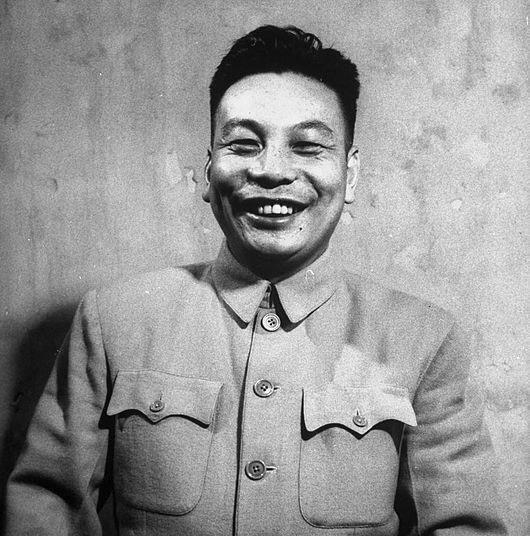Dai Zhiqi could not have imagined in his dreams that in the Battle of Subei, his good brother Hu Lian, who was also the favorite general of Chiang Kai-shek's father and son, would not send troops to rescue him, leaving him trapped in the encirclement of our army and unable to extricate himself. In a helpless situation, Dai Zhiqi wrote a suicide note to Old Jiang, and finally raised a gun to commit suicide and fell into hell.
Dai Zhiqi is a native of Xingyi, Guizhou, born in 1904, and in 1926, he threw his pen from Rong and entered the second phase of the Chaozhou Branch of the Whampoa Military Academy. After graduation, he participated in the Northern Expedition and later entered the Army University, and he was not only the beloved general of the old Chiang Kai-shek, but also the confidant of the younger Chiang Ching-kuo. In 1938, after Chiang Ching-kuo returned to China, he conducted a training class for young cadres in Jiangxi, and Dai Zhiqi served as deputy director of major generals. In 1944, Lao Jiang launched the activity of 100,000 young people to join the army, Chiang Ching-kuo was appointed director of the political department of the "Youth Expeditionary Force", and Dai Zhiqi was transferred to the Youth Army as the commander of the 201st Division.

During the War of Resistance Against Japanese Aggression, Dai Zhiqi participated in the Battle of Songhu, the Battle of Western Hubei and the Battle of Changde, etc. It can be said that Dai Zhiqi was a hero who fought for nine deaths on the anti-Japanese battlefield.
It is precisely because of the love of the father and son of the Jiang family that he has also shown great loyalty to the father and son of the Jiang family.
In 1946, after the reorganization of the Kuomintang army, Dai Zhiqi was promoted to lieutenant general of the reorganized 69th Division (equivalent to the army), and in December he led his troops to attack the East China Field Army in the central Soviet Union.
Dai Zhiqi was earnest in his meritorious service, but he encountered a new unit that had just been formed, the East China Field Army. The new troops must win the first battle, and this is the consensus of the East China Field Army from top to bottom, and this unit is like a fierce tiger descending the mountain, unstoppable.
In order to eliminate this menacing Dai Zhiqi department, Su Yu, commander-in-chief of our army, devised an operational plan of "blocking the reorganized 11th Division head-on, dividing the reorganized 69th Division, and concentrating superior forces on both wings to attack and annihilate it."
On December 15, Dai Zhiqi's troops, who were eager for merit, quickly reached the Fengshan area prepared by our army, and he also felt that Hu Lian's 11th Division was advancing too slowly. The next day, the division of our army and the encirclement of the 69th Division began, and that night, the first column, under the leadership of Ye Fei and He Kexi, resolutely and courageously inserted itself into the depths of the enemy and occupied the line of Gaojiawa and Fujiahu; the first column was inserted south of Xiaodianzi, occupied Santai Mountain, cut off the retreat route of the enemy's reorganized Sixty-ninth Division, and formed a situation of head-on confrontation with the enemy's 11th Division. Under the leadership of Tan Xilin and Zeng Xisheng, the Seventh Division, in close coordination with the Ninth Column Zhang Zhenbu, took advantage of the opportunity of the enemy's 41st Brigade in Shaodian to sneak west and cut off the brigade's contact with its division headquarters.
At this point, Dai Zhiqi panicked, and he repeatedly called to Wu Qiwei and Hu Lian and asked for reinforcements to be sent, but from the evening of the 16th to the next day, Wu Qiwei, Hu Lian, and other reinforcements were still not seen. Finally, after Chiang Kai-shek wrote a "Letter of Cheng Ren", he raised a gun and committed suicide. Dai Zhiqi also became the first senior Kuomintang general to commit suicide on the battlefield since the civil war.
So, why did Dai Zhiqi choose suicide? In the early days of the War of Liberation, our army did not execute the captured senior Kuomintang generals, but generally after education, they were given two choices: one was to choose to join the revolutionary ranks with the people, and the other was to release them back. The reason why he chose to commit suicide was because Hu Lian, who was also a general of the Nationalist army and a concubine of Chiang Kai-shek, saw that he could not be saved, which made him completely cold and completely desperate.
After Dai Zhiqi committed suicide, Chen Yisuyu and others remembered his contributions to the Chinese nation in the War of Resistance Against Japan, but bought a large coffin and buried it thickly.